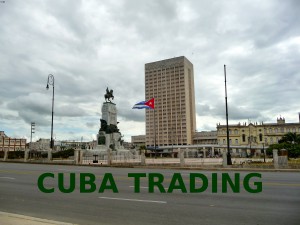Cuba-US: The latest fashion trend
 Obama’s unprecedented reforms towards Cuba, are already showing results. And not just for the entertainment industry.
Obama’s unprecedented reforms towards Cuba, are already showing results. And not just for the entertainment industry.
This dramatic and emotional outburst is growing like a bamboo tree, and the influence of social media has lead people eagerness to know what’s on in the mystical island. Celebrities are no longer concerned in keeping a low profile while traveling to Cuba, the opposite, they are on the front page of any newspaper, some of the bolder ones have made history by extending their trip to cultural events, such as the concert of the Rollin Stone, the fashion show by the legendary Karl Lagerfeld who took his Resort 2017 Chanel show to Havana Cuba.
Hollywood’s filmmakers, supported by the country’s independent production industry shot House of Lies and Fast & Furious in the most impressive historical city, the Old Havana.
So, how did they pull it off?
The Federal Communications Commission (FCC) removed Cuba from its exclusion list enabling U.S.-based telecom operators to provide telephone and Internet services to Cuba without the need of a separate approval from the FCC. And based on that IDT Corp. has formed a J-V with the Cuba’s telecommunications company ETECSA; Verizon Communications Inc. is offer roaming wireless services to its American customers while in Cuba.
According the OFAC, transactions that are directly incident to professional media or artistic productions of information or informational materials for exportation, importation, or transmission, including the filming or production of media programs (such as movies and television program). The Cuban record enterprise EGREM and Sony Music Entertainment signed a licensing agreement for the international distribution of EGREM’s catalog of Cuban music.
Carnival cruise line – Fathom – cultural immersion and people-to-people connections.
All this does not represent a legislative change, as the embargo remains in place, however recent changes have been the cornerstone to overcome the complex red tape procedure in order to get the green light from the US treasure department in any project related to Cuba.
People are changing their skeptical approach, they are coping with the governments bureaucracy by being more persistent and patient, and focusing on results. A couple of examples: Cleber LLC the first US enterprise to operate in the Cuba Mariel Development Zone, Starwood Hotels signed three new hotel deals in Cuba, it’s the first U.S. company in the hospitality sector to launch in the Cuban market.
OFAC has issued a general license authorizing carrier services between the United States and Cuba, directly or indirectly, by vessel, in addition to the existing authorization for provision of such services by aircraft. Its doesn’t include general aviation.
JetBlue the leading airline to the Caribbean already offers nonstop charter services to and from New York, Fort Lauderdale and Havana.
American Airlines, Delta, United Airlines among others have submitted their applications to the US transportation department, hopping to get the required license to fly to Cuba.
Do you need a license, in which category does your business or interest fall?
Different interpretations arrive via different paths, so make sure you are well in formed, by reading the Cuba-US, FAQs
Cuba: Import/Export ( Gov’t contract)
 Foreign companies interested in pursuing contracts with the Cuban state-owned enterprises have to introduce their company to potential government’s representatives, to research the Cuban marketplace for available opportunities, and understand how it works.
Foreign companies interested in pursuing contracts with the Cuban state-owned enterprises have to introduce their company to potential government’s representatives, to research the Cuban marketplace for available opportunities, and understand how it works.
Some facts to take into consideration:
It is not a free market
Most of the Cuban economy is under state ownership, which means the market is controlled and regulated by government policy, thus based on the fact that your partner will be the government, the competition is almost zero.
Assessment and acceptance
As probably most of you know, selling to the government is different than selling to a private sector, and Cuba isn’t an exception. You should make sure you know your own company inside and out. Experience counts, and the government also looks for financial stability; which indicates you’ll be in business in the years to come.
In short you have to prove who you are what you do.
Public procurement
The government purchases goods and services, which must meet certain requirements, such as the best possible cost to meet the needs in terms of quality and quantity. Your products or services need to be aligned with the Cuban economic model in terms of improvements and social interest.
To facilitate public procurement your company should be registered with the state-run agencies to be placed on potential supplier lists. If you are ready to bid on government contracts, it’s necessary to submit your business profile to the government agencies that are used to locate contractors.
Build a relationship
Government officials are also human beings, and therefore they like you also need to know the person behind the potential partner. Get your foot in the door, go to Cuba and meet them, participate in their business events, show your interest, it will help you know better marketplace opportunities and figure out if there is a real business opportunity for you.
Wholesale and Retail business are run by agencies set up as corporations by the government. Forget about the idea of your home rules related to exporting/importing your goods and services by yourself, it doesn’t apply, getting a government contract is the way to go.
Trading between Cuban entrepreneurs and the US
 Can American citizens import any goods from Cuban entrepreneurs?
Can American citizens import any goods from Cuban entrepreneurs?
If true, it’s hardly inspirational for the Cuban entrepreneurs. On the other hand looking to the bright side of such “opportunity”, it can be the push to demonstrate our creativity skills.
If we take a look at the list of products which are not allowed to be imported into the United States & knowing the basic material (raw material ) used for its production it’s controlled by state-owned Cuban enterprises, we’ll realize why they don’t fall within the category.
Thus, what is allowed?
Everything else which is not in the list as long as it complies with the regulation in force.
Nevertheless it hasn’t caught us by surprise to know that the new regulation allows to import services from the Cuban private sector, if we take into account that Americans may hire well qualified Cuban professionals, such as accountants, designers, programmers, translators among others, as long as they can prove that they are independent entrepreneurs, cooperatives or self-employed. It doesn’t sound like a bad deal. Win-win?
The United States to indicate categories of goods that are not eligible for import into the United States pursuant to § 515.582, even if such goods were produced by independent Cuban entrepreneurs; any other goods produced by independent Cuban entrepreneurs and not covered by the listed sections and chapters of the HTS may be imported. All services supplied by independent Cuban entrepreneurs are eligible for import.
Easing the trade between Cuban entrepreneurs and American citizens. Who holds the aces?
